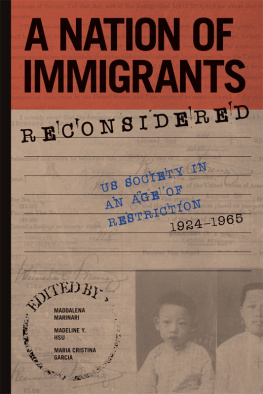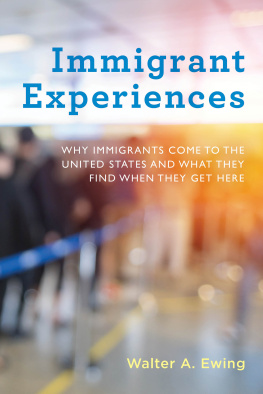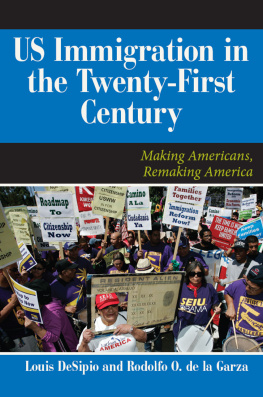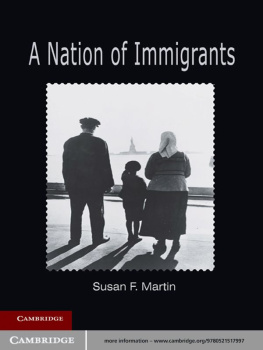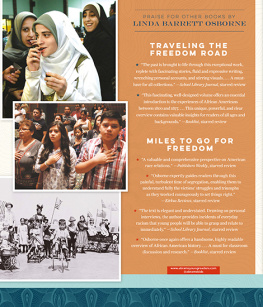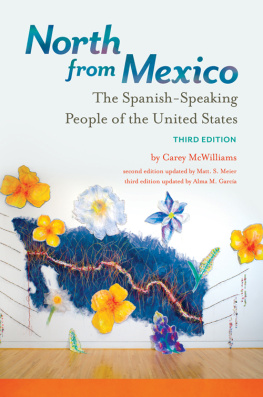A Nation of Immigrants Reconsidered
STUDIES OF WORLD MIGRATIONS
Madeline Hsu and Marcelo Borges, editors
A list of books in the series appears at the end of the book.
A Nation of Immigrants
Reconsidered
US Society in an Age of Restriction,
19241965
Edited by
MADDALENA MARINARI
MADELINE Y. HSU
MARA CRISTINA GARCA
2019 by the Board of Trustees
of the University of Illinois
All rights reserved
Library of Congress Cataloging-in-Publication Data
Names: Marinari, Maddalena, editor. | Hsu, Madeline Yuan-yin, editor. | Garcia, Maria Cristina, 1960 editor.
Title: A nation of immigrants reconsidered : US society in an age of restriction, 19241965 / edited by Maddalena Marinari, Madeline Y. Hsu, Maria Cristina Garcia.
Description: [Urbana] : University of Illinois, [2019] | Series: Studies of world migrations | Includes bibliographical references and index.
Identifiers: LCCN 2018027423| ISBN 9780252042218 (cloth : alk. paper) | ISBN 9780252083969 (pbk. : alk. paper)
Subjects: LCSH : United StatesEmigration and immigrationHistory20th century. | United StatesEmigration and immigrationGovernment policy. | ImmigrantsUnited StatesHistory20th century.
Classification: LCC JV 6455 . N 37 2019 | DDC 305.9/06912097309041--dc23 LC record available at https://lccn.loc.gov/2018027423
Ebook ISBN : 978-0-252- 05095-4
Cover illustration: Yee Shee visa application, 1929, Chinese
Exclusion Act case files, RG 85, National Archives-Seattle,
Yee Shee case file, Seattle Box 1155, 11627/3-3.
Contents
Elliott Young
Kathleen Lpez
Laura Madokoro
David FitzGerald and David Cook-Martn
Heather Lee
Ronald L. Mize
Monique Laney
Eiichiro Azuma
Ruth Ellen Wasem
Lorrin Thomas
Arissa H. Oh
Ana Elizabeth Rosas
Violet Showers Johnson
Acknowledgments
T he editors wish to thank a number of people who played a critical role in the development of this anthology. We are grateful to our fourteen contributors (in alphabetical order): Eiichiro Azuma, David Cook-Martn, David FitzGerald, Monique Laney, Heather Lee, Kathleen Lpez, Laura Madokoro, Ronald Mize, Arissa Oh, Ana Elizabeth Rosas, Violet Showers Johnson, Lorrin Thomas, Ruth Ellen Wasem, Elliott Young. Your scholarship inspires us, and we could not imagine this anthology without your participation. Thank you for your support and enthusiasm for this project and for your many helpful suggestions.
During the initial stages of planning this project, the editors agreed that it would be beneficial for the contributing authors to meet as a group and discuss how their scholarship elucidated the key themes of the anthology. We also hoped that bringing the authors together would foster an intellectual community across scholars working in different disciplines and contribute to a more nuanced understanding of the different approaches to the study of migration. We organized a workshop in March 2016 at the University of Texas at Austin, hosted by the Department of History and its affiliated Institute for Historical Studies (IHS), which accomplished these goals. Our conversations helped each of us gain a better understanding of the 19241965 period and clarified the multiple ways in which policies shaped immigration flows during these misunderstood yet formative years. For their generosity and vision, we thank History Department Chair Jacqueline Jones as well as Dean Randy Diehl of the College of Liberal Arts. Our project also received significant funding from Dean Angela Evans and Professor Edwin Dorn of the LBJ School of Public Affairs, Director Pauline Strong of the Humanities Institute and the Sterling Clark Holloway Centennial Lectureship in the Liberal Arts, Director Charles Hale of the LLILAS Benson Latin American Studies Institute and Collections, Director John Morn Gonzlez of the Center for Mexican American Studies, Chair Nicole Guidotti-Hernndez of the Department of Mexican American and Latino Studies, Director Huaiyin Li of the Center for East Asian Studies, IHS Director Seth Garfield, and Director Sharmila Rudrappa and Assistant Director Sona Shah of the Center for Asian American Studies. Jacquelin Llado processed accounting transactions and Christina Villareal served as our note taker for all proceedings.
During that long weekend, three of our contributors, Ana Elizabeth Rosas, David FitzGerald, and Ruth Wasem (as well as Kelly Lytle Hernandez), generously participated in a well-received public roundtable, Controlling the Border? Labor, Lives, and Policy. We owe particular thanks to program coordinator Courtney Meador for her grace, good cheer, and resourcefulness in arranging the logistics of our workshop and public roundtable as well as our travel and accommodations.
We are grateful to Gaynel Kline and Gary Voerman for offering us their lovely Seattle home as a retreat where we could write the introduction of the anthology and begin the first round of edits. Sherman Cochran and Bryan Messerly later read the introduction and offered us helpful comments that made it more accessible to a non-specialist audience. We are also grateful to the anonymous reviewers for their careful reading of the chapters and their thoughtful suggestions.
We had the exceptional good fortune to work with James Engelhardt at the University of Illinois Press, who could not have been a more supportive and helpful editor. We are excited that the book is published as part of UIPs Studies of World Migration series, and we are grateful to Marcelo Borges, Madeline Hsus series co-editor, for his suggestions. We are grateful to Alison Syring, the assistant acquisitions editor, for her suggestions, and to the production and marketing team for publishing this anthology in a timely fashion.
We also want to thank our family and friends for their love and support in all our professional endeavors. Last but not least, we are grateful that we had an opportunity to work together on this project. From the beginning, we believed in the contribution that this project could make, especially during todays highly politicized debates on immigration, but it was wonderful to discover how well we worked together. Our collaborative efforts have showcased how fruitful and meaningful can be the outcomes of fostering intellectual communities and speaking across disciplines and regional specializations toward attaining a broader and better understanding of the difficult world we share.
A Nation of Immigrants Reconsidered
Introduction
I n October 1945, German scientist Wernher von Braun arrived in the United States to begin work for the US Army. His development of the German V-2 rocket made him one of the most sought-after scientists of the postwar period. In order to facilitate his arrival, government authorities expunged records of his memberships in the Nazi Party and the German elite paramilitary organization known as the SS. They also expedited his immigration and security clearance so he could develop ballistic missiles for the United States and, eventually, design the NASA rockets that transported the first satellites and men into space. By 1955, he was an American citizen.
Three years after von Braun came to the United States, Sachiko Pfeiffer, a Japanese national, immigrated as the war bride of an American military veteran. Though most Asians were barred by law from immigrating to the United States at this time, Pfeiffer and her white husband were able to settle in Illinois, one of the few states where interracial marriage was possible. Sachikos path to integration took longer than von Brauns for she would not even qualify for citizenship until the 1952 McCarran-Walter Act permitted Japanese immigrants to naturalize. Though sympathetically portrayed in a Life magazine article in 1955 by novelist James Michener, it took until the birth of her first son for Sachiko to overcome the reservations of Franks family and her neighbors.

